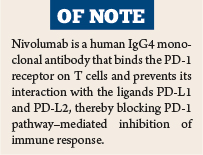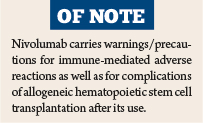In the Clinic provides overviews of novel oncology agents, addressing indications, mechanisms, administration recommendations, safety profiles, and other essential information needed for the appropriate clinical use of these drugs.
On February 2, 2017, nivolumab (Opdivo) was granted accelerated approval for the treatment of patients with locally advanced or metastatic urothelial carcinoma who have disease progression during or after platinum-containing chemotherapy or have disease progression within 12 months of neoadjuvant or adjuvant treatment with platinum-containing chemotherapy.1,2
Supporting Efficacy Data
Approval was based on response rate and durability of response in a single-arm phase II study (CheckMate 275) in 270 patients receiving nivolumab at 3 mg/kg every 2 weeks until disease progression or unacceptable toxicity.2,3 Patients were excluded for active brain or leptomeningeal metastases, active autoimmune disease, medical conditions requiring systemic immunosuppression, and an Eastern Cooperative Oncology Group performance status > 1. Patients had a median age of 66 years (range = 38–90 years), 78% were male, 86% were white, 46% had a performance status of 1, 27% had nonbladder urothelial carcinoma, 84% had visceral metastases (28% liver metastases), 34% had disease progression after platinum-containing neoadjuvant or adjuvant therapy, 29% had received at least 2 prior systemic regimens in the metastatic setting, 36% received prior cisplatin only, 23% received prior carboplatin only, and 7% received both agents in the metastatic setting.
Patients were included regardless of programmed cell death ligand 1 (PD-L1) status. Overall, 46% had PD-L1 expression of ≥ 1%, and 54% had PD-L1 expression < 1% on central laboratory testing with the PD-L1 immunohistochemistry (IHC) 28-8 pharmDx assay.

Median duration of treatment was 3.3 months (range = 0–13.4+ months). The confirmed objective response rate was 19.6% (95% confidence interval [CI] = 15.1%–24.9%) among all patients (complete response in 7 patients [2.6%], partial response in 46 patients [17.0%]), including rates of 15.1% (95% CI = 9.7%–21.9%) in 146 patients with PD-L1 expression < 1% (complete response in 1 [0.7%]) and 25.0% (95% CI = 17.7%–33.6%) among 124 patients with PD-L1 expression ≥ 1% (complete response in 6 patients [4.8%]). Among 77 patients who received prior systemic therapy only in the neoadjuvant or adjuvant setting, the response rate was 23.4% (95% CI = 14.5%–34.4%).
Median time to response was 1.9 months (range = 1.6–7.2 months). Median duration of response was 10.3 months (1.9+ to 12.0+ months) in all patients, 7.6 months (3.7 to 12.0+ months) in those with PD-L1 expression < 1%, and not estimable (1.9+ to 12.0+ months) in those with PD-L1 expression ≥ 1%.
How It Works
Nivolumab is a human immunoglobulin G4 (IgG4) monoclonal antibody that binds the programmed cell death protein 1 (PD-1) receptor on T cells and prevents its interaction with the ligands PD-L1 and PD-L2, thereby blocking PD-1 pathway–mediated inhibition of immune response, including antitumor immune response. Binding of PD-L1 and PD-L2 to the PD-1 receptor inhibits T-cell proliferation and cytokine production. Upregulation of PD-1 ligands occurs in some tumors, and signaling through this pathway can contribute to inhibition of active T-cell tumor immune surveillance. In syngeneic mouse tumor models, blocking PD-1 activity results in decreased tumor growth.
How It Is Used
The recommended dose of nivolumab in urothelial carcinoma is 240 mg given as an intravenous infusion over 60 minutes every 2 weeks until disease progression or unacceptable toxicity. Infusion should be interrupted or slowed in patients with mild or moderate infusion reactions. Nivolumab should be discontinued for severe or life-threatening infusion reactions.
Accelerated Approval of Nivolumab
- Nivolumab (Opdivo) was granted accelerated approval for the treatment of patients with locally advanced or metastatic urothelial carcinoma who have disease progression during or after platinum-containing chemotherapy or have disease progression within 12 months of neoadjuvant or adjuvant treatment with platinum-containing chemotherapy.
- The recommended dose of nivolumab in urothelial carcinoma is 240 mg given as an intravenous infusion over 60 minutes every 2 weeks until disease progression or unacceptable toxicity.
In patients receiving nivolumab for urothelial carcinoma, treatment should be withheld for grade 2 pneumonitis, grade 2 or 3 diarrhea or colitis, alanine transaminase (ALT) or aspartate transaminase (AST) > 3 to 5 times the upper limit of normal or total bilirubin > 1.5 to 3 times the upper limit of normal, serum creatinine > 1.5 to 6 times the upper limit of normal, grade 2 or 3 hypophysitis, grade 2 adrenal insufficiency, grade 3 hyperglycemia, grade 3 rash or suspected Stevens-Johnson syndrome or toxic epidermal necrolysis, new-onset moderate or severe neurologic signs or symptoms (potential immune-related encephalitis), and first occurrence of other grade 3 adverse reactions. There are no recommended dose modifications for hypothyroidism or hyperthyroidism.
Nivolumab should be permanently discontinued for grade 4 diarrhea or colitis, grade 4 hypophysitis, grade 3 or 4 adrenal insufficiency, grade 4 hyperglycemia, grade 4 rash or confirmed Stevens-Johnson syndrome or toxic epidermal necrolysis, grade 3 or 4 pneumonitis, AST or ALT > 5 times the upper limit of normal or total bilirubin > 3 times the upper limit of normal, serum creatinine > 6 times the upper limit of normal, immune-mediated encephalitis, recurrence of grade 3 adverse reactions, life-threatening or grade 4 adverse reactions, requirement of ≥ 10 mg/d of prednisone or equivalent for > 12 weeks, and persistent grade 2 or 3 adverse reactions lasting ≥ 12 weeks.
Safety Profile
In the phase II trial, the most common adverse events of any grade were fatigue/asthenia (46%), musculoskeletal pain (30%), nausea (22%), and decreased appetite (22%). The most common grade 3 or 4 adverse events were fatigue/asthenia (7%), urinary tract infection (7%), and dyspnea (3.3%). The most common grade 3 or 4 laboratory abnormalities were lymphopenia (9%), anemia (7%), and increased alkaline phosphatase (5.5%). Serious adverse events occurred in 54% of patients, with the most frequent (≥ 2% of patients) being urinary tract infection, sepsis, diarrhea, small intestine obstruction, and general physical health deterioration. Adverse events led to drug delay in 46% of patients. A total of 9% of patients received an oral prednisone dose equivalent to ≥ 40 mg daily for an immune-mediated adverse event. Death from causes other than disease progression occurred in 14 patients (5.2%), including death from pneumonitis or cardiovascular failure considered related to nivolumab in 4 patients.

Nivolumab carries warnings/precautions for immune-mediated adverse reactions, including immune-mediated pneumonitis, colitis, hepatitis, endocrinopathies, nephritis and renal dysfunction, skin adverse reactions, and encephalitis. It also carries warnings/precautions for infusion reactions, complications of allogeneic hematopoietic stem cell transplantation after nivolumab treatment, and embryofetal toxicity. Patients should be monitored for changes in liver, kidney, thyroid, and neurologic function and for hyperglycemia. Breastfeeding women should discontinue breastfeeding while receiving nivolumab. ■
References
1. U.S. Food and Drug Administration: Nivolumab for treatment of urothelial carcinoma. Available at http://www.fda.gov/Drugs/InformationOnDrugs/ApprovedDrugs/ucm539646.htm. Accessed February 8, 2017.
2. Opdivo (nivolumab) injection prescribing information. Bristol-Myers Squibb, February 2017. Available at https://packageinserts.bms.com/pi/pi_opdivo.pdf. Accessed February 8, 2017.

